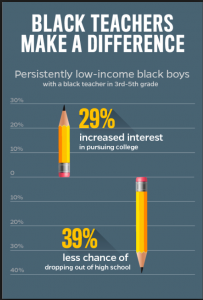When studying the effects of charter schools, it is helpful to consider the work done by both Prothero (2016) and Kalam Id-Din II (2017). While Prothero (2016) highlights the negative impact that charters have had on black communities, Kalam Id-Din II (2017) challenges this assertion by declaring that the problem is not charter schools; instead, it is the lack of black leadership in education that is found in both charter schools and public schools.
Prothero (2016) analyzes the reasons why civil rights groups like the NAACP argued for a moratorium on charter schools in 2016. Historically, education has played a large role in the black community: the civil rights movement highlighted educational opportunity for black students as an important goal and black employees were hired in schools before they were hired in different branches of the public sector (Prothero, 2016). In recent years, however, the proliferation of charter schools has led to “black schools being closed [and] black teachers losing their jobs and being devalued” (Prothero, 2016, p. 2). Thus, charter schools have had a negative effect on both black students and teachers. Moreover, the proliferation of charter schools has led to black communities “losing control of their public schools” as education reformers bring “reform ideas, [such as] charter schools, but [don’t] hire local teachers” (Prothero, 2016, p. 1). In other words, the reformers usurp the forms of autonomy that existed within black community and enforce their own ideas of progress and success. Despite their negative impacts on black communities, however, many black people still support charters. In fact, using a 2016 poll from Education Next, Prothero (2016) reveals that forty-five percent of black respondents either completely or somewhat supported charter schools.
Kalam Id-Din II (2017) would belong to this cohort as he, a black man, supports charter schools, but believes that they- and all other forms of education for black students- should be led by black educators. Since the Brown v. Board decision of 1954, many educators have seen integration as the way to close the achievement gap but Kalam Id-Din II (2017) asserts that black-white integration is a mere “placebo” that “allows reformers to ignore effective evidenced-based solutions” (p. 1). For example, a John Hopkins University study revealed that the likelihood of low-income black students dropping out of school dropped by 29 percent when those students had just one black teacher between the third and fifth grade (Kalam Id-Din II, 2017).

Black Teachers Make a Difference, John Hopkins University Research
Based on this evidence, more black teachers should be placed into schools as their presence has a positive impact on black students’ academic future. The evidence for integrated schools, on the other hand, provides less promising evidence as the achievement gap persists despite the “tremendous effort [put] into integrated classrooms” (Kalam Id-Din II, 2017, p. 2). For charter schools that serve high numbers of low-income black students, impressive academic outcomes are often times the result of “intensive test preparation”, and stringent “behavior-management policies,” rather than student’s confidence (Kalam Id-Din II, 2017, p. 2). Kalam Id-Din II (2017) encourages schools to make the recruitment and retention of black educators a priority, then, in order to not only close the achievement gap, but also to promote student agency within classrooms and prevent negative school experiences such as suspensions and expulsions that are a result of cultural misunderstanding rather than true behavioral issues.
Sources:
Prothero A. (2016). “Charter Schools Aren’t Good for Blacks, Civil Rights Groups Say.” EducationWeek, Vol. 36(2), pp. 1, 14.
Kalam Id-Din II, R.R. (2017). “Black Teachers Matter. School Integration Doesn’t: To Close the Achievement Gap We Need More Black Educators.” EducationWeek, Vol. 36(30), pp. 24-25.
